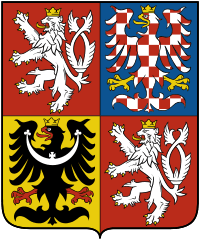How to put a smile on mom's face? The pioneering Perinatal.cz project explores the female psyche during pregnancy and maternity

- ←
- →
Published
Updated 31-10-2024
In the Perinatal.cz project, the National Institute of Mental Health and Úsměv mámy (Smile of the Mum) NGO focused on the issue of women's mental health during pregnancy and motherhood. This is an area that has never been systematically addressed in the Czech Republic.
The National Institute of Mental Health, specifically psychiatrist Antonín Šebela, M.D., Ph.D., is behind the project, which ran for three years from February 2021 to January 2024. He is the leading expert on this topic in the Czech Republic and also the expert supervisor of the project.
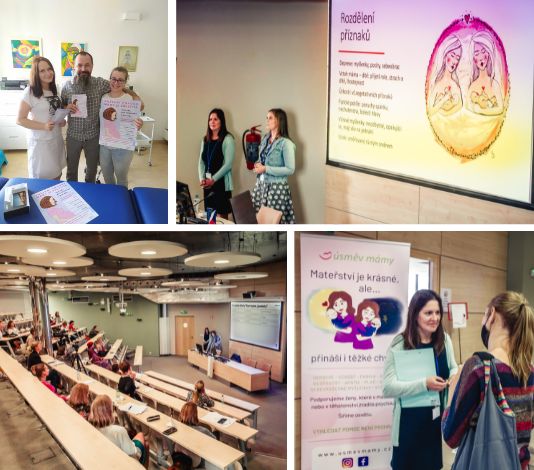
Distribution of materials to ambulances and project workshop
"How are you feeling?" the staff at the gynaecology and maternity clinics began to ask the mothers.
Screening for many diseases and health problems is now routinely carried out. These are designed to detect signs that indicate an increased risk of developing a disease. Part of the project is therefore looking for an efficient way to identify those mothers who might be at risk of mental health problems.
The goal of Dr. Šebela and his team is to find a test in a registered study that is both simple to evaluate and points to as many high-risk cases as possible. And that could become a routine part of the healthcare system in the future. Screening is the best way to prevent more serious health problems.
"We are comparing two lines of testing: ambulatory at gynaecologists and in maternity hospitals, where the questionnaire is filled in by mothers after giving birth," says Dr Šebela, describing the process of finding the best way for both the woman and the child. "The questionnaires ask about depression, anxiety, psychosocial stresses such as employment, partner relationships or domestic violence. We ask pregnant women about building a relationship with their baby. After giving birth, for example, we ask questions about the woman's confidence in her parenting skills or her quality of life," says Dr Šebela, who explains that the questionnaires have to be comprehensive during the study so that no important area that can lead to the development of mental health problems is missed.
As part of the project, women were given a survey tablet in twenty gynaecological outpatient clinics in the Central Bohemia Region, Prague and the Olomouc Region, and in the Prague maternity hospitals in Krč and Bulovka, the maternity hospital in Nymburk and the University Hospital Olomouc.
What happens to the data next?
Questionnaires evaluated at the National Institute of Mental Health highlight women who are not feeling well. "Around half of them are only sent links and contacts so they know where to go if they themselves need help. The other half are then contacted directly by peer counsellors from Smile of the Mum NGO," explains the project's expert supervisor A. Šebela.
The project also tested how to select women and how to contact the selected mothers in order to make the system as efficient as possible. "First, it was evaluated based on the score, then the women themselves could tick whether they wanted to be contacted," says Jana Klečková, who has been working as a peer consultant for over 2 years and helps mothers. About half of those she contacted based on the results of the questionnaires called back and were interested in some type of consultation.
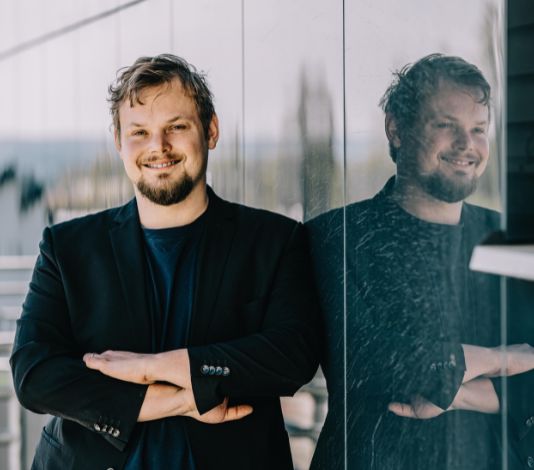
Expert supervisor of the project MUDr. Antonín Šebela, Ph.D.
Mum supports mum
Mum supports mum - that's the name of the second part of the project. It is run by the organisation Smile of Mum NGO, which is also a project partner of the National Institute of Mental Health. It is a team of peer consultants from this organisation who write or call the selected mothers. "Someone will use the possibility of consultation, someone will not, it all depends on how the mum is currently feeling. Some people refuse the help, saying that everything is fine after returning home from the hospital. Some people just need to hear that there is a possibility of help, that there is somewhere to turn. Some people need to talk for an hour and then never hear back. And then there are clients for whom we set up a long-term peer collaboration," says Jana the peer. She is a mum herself and likes to participate in something she finds meaningful. "I personally wasn't offered anything like this at the maternity hospital and it would have been very useful at the time," adds Jana, a mother of two who herself went through a difficult time after their birth.
The vast majority of Jana´s contacts with clients are by phone or online. "It provides anonymity and security. Mothers often talk about not enjoying it. They confide that they expected love for their baby from the very beginning, but it didn't come right away. This is a hard thing to say face to face," says Jana, whose mission is to listen and support mums in all their feelings.
Her client Iva, who used the help of a peer consultant after the birth of her second child, also agrees: 'It is a safe environment where there is trust, acceptance and recognition of feelings. It's a place where it's totally okay to be upset about something."
Enjoy! Is mum's smile automatic and natural?
´What are you complaining about? It's the most wonderful time of your life, it won't happen again. You've got a beautiful, healthy baby. What do you want?´ Have you ever heard such phrases?
But sometimes mothers can't feel this 'obligatory happiness'. For Iva, none of her pregnancies were the most beautiful times of her life. "It wasn't so much taking care of the baby that exhausted me, but I had a problem with the maternity routine. I was suddenly at home, I lost my freedom. And I lost my economic independence," says Iva, for whom the need for independence is a key issue in her life. It was hard for her to cope with not being able to work as much as she needed to while on maternity leave.
Moreover, as a result of the divorce and the subsequent covid pandemic, she lost a large number of social contacts. "There is a disabled child in my family, so I know what 24/7 care means and it's actually clear to me that I have nothing to complain about," she says, explaining why she needs to get her emotions out elsewhere. "I don't have to feel bad in the face of a peer because I have healthy children and I'm doing well. Because that doesn't mean I don't have the right to be sad, to complain, or to want something different," Iva concludes.
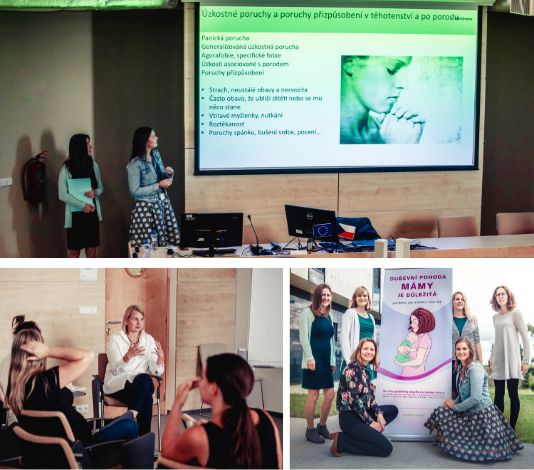
How is mum doing?
Lucie Beránková, M.D., who takes care of expectant and new mothers in the gynaecological outpatient clinic, also positively evaluates the whole project. "The project focused on women after childbirth and can be a very important point in the care of a woman in her puerperium. Her not only physical, but also mental condition is involved in supporting the healthy growth and development of the newborn and the family as a whole. During this period, women go through changes on both a physical and psychological level. They face many challenges, such as health problems or difficult social situations." describes the doctor.
Jana Klečková thinks the same thing: "It's important to ask these mothers how they feel mentally and not just take their temperature all the time," the peer from Smile of the Mum NGO says with a touch of exaggeration.
"I would like to be part of such a project, because in my practice as a hospital doctor in the gynaecology and obstetrics department or as a gynaecologist in an outpatient clinic I do not have the tools to take care of a woman's psyche," adds MUDr. Beránková, adding that she considers the questionnaire and the subsequent care of women to be a good tool to ensure that a woman is taken care of from a psychological point of view.
The first step towards a systemic solution?
With the Perinatal.cz project, the National Institute of Mental Health and the non-profit organization Smile of a Mother have opened up discussion and attention to the psyche of women during pregnancy, childbirth and postpartum. In some countries, such as Australia and the UK, there is care for women who develop psychological problems in connection with the birth of a child.
The project, which combines general screening and multi-stage care linked to it, is the first step towards the advanced care for maternal psyche that we know, for example, from these countries.
"It has certainly given me a lot. And it should be part of standardised care - alongside gynaecology and obstetrics, psychological care should be available from the beginning of pregnancy. This will prevent women from thinking of themselves as crazy," says the mother Iva about the peer consultations she participated in thanks to the project. "It also has an effect on my partner. There is research that says that if the baby's mother has psychological problems, there is half the chance that the partner will have them too. And it is a known fact that prevention is much cheaper for the system than dealing with the problem afterwards," Iva is sure.
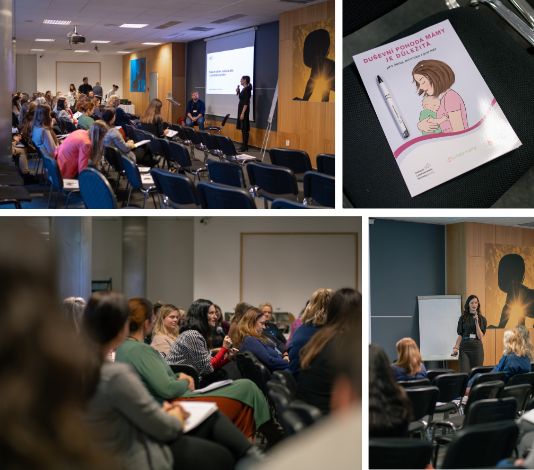
Closing conference of the project, November 2023, Prague
Here you can watch the video from the closing conference summarizing the results of the project (Czech language only)
Text: eeagrants.cz Poto: project promoter
Project infos:
The project Pregnancy without psychosocial stress - the earliest prevention of mental disorders and toxic stress in children was implemented under the Health Programme and funded by the EEA Grants
More about Health Programme
Project web: Perinatal.cz
| Project name: | Pregnancy without psychosocial stress - the earliest prevention of mental disorders and toxic stress in children |
|---|---|
| Project promoter: | Národní ústav duševního zdraví, z. ú. (National Institute of Mental Health NGO) |
| Project partner: | Úsměv mámy, z.s. (Smile of the Mum, NGO) |
| Programme: | Health |
| Grant amount: | CZK 10 918 753 |
| Objective of the project: |
The main aim of the project is to increase the promotion of mental health and well-being of unborn children and children soon after their birth who are exposed to psychosocial stress of their mothers. Thanks to the implementation of the project, there will be a tool for early prevention of the development of mental disorders and discomfort in children at risk in our environment. The implementation of our project will significantly improve the future mental health of these at-risk children. |
